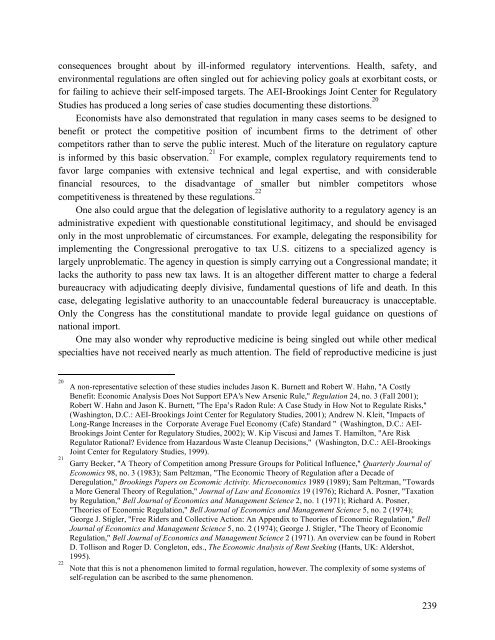Final Report (all chapters)
Final Report (all chapters)
Final Report (all chapters)
Create successful ePaper yourself
Turn your PDF publications into a flip-book with our unique Google optimized e-Paper software.
consequences brought about by ill-informed regulatory interventions. Health, safety, and<br />
environmental regulations are often singled out for achieving policy goals at exorbitant costs, or<br />
for failing to achieve their self-imposed targets. The AEI-Brookings Joint Center for Regulatory<br />
Studies has produced a long series of case studies documenting these distortions. 20<br />
Economists have also demonstrated that regulation in many cases seems to be designed to<br />
benefit or protect the competitive position of incumbent firms to the detriment of other<br />
competitors rather than to serve the public interest. Much of the literature on regulatory capture<br />
is informed by this basic observation. 21 For example, complex regulatory requirements tend to<br />
favor large companies with extensive technical and legal expertise, and with considerable<br />
financial resources, to the disadvantage of sm<strong>all</strong>er but nimbler competitors whose<br />
competitiveness is threatened by these regulations. 22<br />
One also could argue that the delegation of legislative authority to a regulatory agency is an<br />
administrative expedient with questionable constitutional legitimacy, and should be envisaged<br />
only in the most unproblematic of circumstances. For example, delegating the responsibility for<br />
implementing the Congressional prerogative to tax U.S. citizens to a specialized agency is<br />
largely unproblematic. The agency in question is simply carrying out a Congressional mandate; it<br />
lacks the authority to pass new tax laws. It is an altogether different matter to charge a federal<br />
bureaucracy with adjudicating deeply divisive, fundamental questions of life and death. In this<br />
case, delegating legislative authority to an unaccountable federal bureaucracy is unacceptable.<br />
Only the Congress has the constitutional mandate to provide legal guidance on questions of<br />
national import.<br />
One may also wonder why reproductive medicine is being singled out while other medical<br />
specialties have not received nearly as much attention. The field of reproductive medicine is just<br />
20<br />
21<br />
22<br />
A non-representative selection of these studies includes Jason K. Burnett and Robert W. Hahn, "A Costly<br />
Benefit: Economic Analysis Does Not Support EPA's New Arsenic Rule," Regulation 24, no. 3 (F<strong>all</strong> 2001);<br />
Robert W. Hahn and Jason K. Burnett, "The Epa’s Radon Rule: A Case Study in How Not to Regulate Risks,"<br />
(Washington, D.C.: AEI-Brookings Joint Center for Regulatory Studies, 2001); Andrew N. Kleit, "Impacts of<br />
Long-Range Increases in the Corporate Average Fuel Economy (Cafe) Standard " (Washington, D.C.: AEI-<br />
Brookings Joint Center for Regulatory Studies, 2002); W. Kip Viscusi and James T. Hamilton, "Are Risk<br />
Regulator Rational? Evidence from Hazardous Waste Cleanup Decisions," (Washington, D.C.: AEI-Brookings<br />
Joint Center for Regulatory Studies, 1999).<br />
Garry Becker, "A Theory of Competition among Pressure Groups for Political Influence," Quarterly Journal of<br />
Economics 98, no. 3 (1983); Sam Peltzman, "The Economic Theory of Regulation after a Decade of<br />
Deregulation," Brookings Papers on Economic Activity. Microeconomics 1989 (1989); Sam Peltzman, "Towards<br />
a More General Theory of Regulation," Journal of Law and Economics 19 (1976); Richard A. Posner, "Taxation<br />
by Regulation," Bell Journal of Economics and Management Science 2, no. 1 (1971); Richard A. Posner,<br />
"Theories of Economic Regulation," Bell Journal of Economics and Management Science 5, no. 2 (1974);<br />
George J. Stigler, "Free Riders and Collective Action: An Appendix to Theories of Economic Regulation," Bell<br />
Journal of Economics and Management Science 5, no. 2 (1974); George J. Stigler, "The Theory of Economic<br />
Regulation," Bell Journal of Economics and Management Science 2 (1971). An overview can be found in Robert<br />
D. Tollison and Roger D. Congleton, eds., The Economic Analysis of Rent Seeking (Hants, UK: Aldershot,<br />
1995).<br />
Note that this is not a phenomenon limited to formal regulation, however. The complexity of some systems of<br />
self-regulation can be ascribed to the same phenomenon.<br />
239


